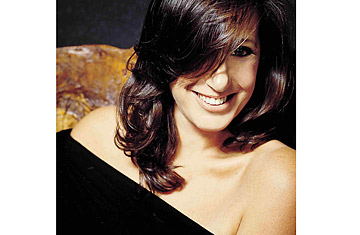
(2 of 3)
"You felt it, didn't you?" she asks, alluding to the solace that a space like this can invoke, how an environment can affect your mood, your energy and how you feel. Quantifying that effect, as best as science can, she says, is the goal of her collaboration with Beth Israel. At one point after her husband Stephan Weiss — an artist, sculptor and executive in Karan's fashion business — received a diagnosis of lung cancer in 1996, doctors told her there was nothing more that medicine could do for him. "Now what was I supposed to do?" says Karan. "I was completely lost. I didn't know how to handle the process."
Karan turned to the only tools she had for navigating life's challenges and the only ones that had reliably helped her during previous crises: yoga and meditation. She urged her husband to explore these modalities in order to relieve his anxiety and improve his breathing. "It wasn't his path — he thought it was another one of my woo-woo trips," she says. "But he realized it was what he needed, and yoga became an important part of his well-being. He would do Iyengar yoga, and it would help him breathe and open up his lungs to keep him calm."
Soon after Karan's husband's diagnosis, her good friend Lynn Kohlman, a model and photographer, learned she had breast cancer, which eventually spread to her brain and required surgery. As someone caring for loved ones who were so ill, Karan realized that the medical system was addressing only one aspect of their needs. While hospitals and high-tech procedures are adept at diagnosing, measuring and treating illness, they do little, if anything, to address how patients feel as they journey through one of the most terrifying and unpredictable experiences of their lives. "I realized they were treating the disease, but nobody was treating the patient," she says. "Who is sitting with you when you're going through chemotherapy? Who is putting you in a state of calm to help you deal with your panic, your fears and concerns over what is happening to your body?"
Sitting around her dinner table one evening with Rodney Yee, her longtime yoga instructor, and Dr. Woodson Merrell, her physician and the chairman of the department of integrative medicine at Beth Israel, Karan expressed her frustration with how modern medicine focuses, laser-like, on treatments and procedures, to the exclusion of a patient's well-being. "There is a sense that you have traditional and alternative medical care, and I said, It's not either/or," says Karan. "It's not a disease we are dealing with but a patient."
Yee suggested bringing yoga techniques into the medical setting to teach patients about calming and restorative postures, but Karan, with her usual creative zeal and passion, was thinking bigger. Within a month, she had called dozens of the nation's leading health-care experts from both the alternative and traditional realms and cajoled them into convening at a 10-day well-being forum to brainstorm about knitting the two worlds together to best serve patients.
From those sessions came the idea to create and train an entirely new member of the medical team: the integrative-health therapist. Working with Merrell and the staff at Beth Israel, Karan donated $850,000 to establish an educational program that will initially train 100 practitioners in yoga, meditation, acupuncture, aromatherapy and other alternative techniques to help patients relax and heal. It's an approach that flows well with Merrell's thinking about health care; he taught one of the first courses in the country on integrative medicine in medical school, at Columbia University. "It doesn't make sense. If things are safe and have a published evidence base, then why aren't they a standard part of the health-care system?" asks Merrell. "Why don't doctors think of recommending the gentlest, safest things first rather than going off with a howitzer immediately?"